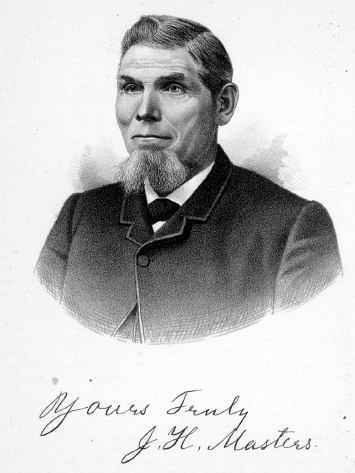a pioneer there. At the breaking out
of the Revolution he immediately entered into the
service of the Colonists, and throughout the entire
conflict was an active and efficient soldier. He was a
bearer of dispatches, and received for his pay
continental script, which depreciated until it was of
no value. He was a wagon-maker, and had a shop on his
farm in which he did repairs when not engaged in
agricultural pursuits. Directly after the war he
removed to Virginia, but it is not known where he
first located in that State. He subsequently settled
in Greenbrier County, where he had bought a tract of
land. In 1808 he left Virginia for Kentucky, the
removal being made with teams, and he became a pioneer
of Warren County. He was quite well along in years,
and made his home in that State with his son Charles
until his death.
The father of our subject was a
young man when his parents went to Virginia, and he
accompanied them, and there met and married Agnes
Cochran, a native of the State. He learned the trade
of wagon-maker from his father, and removed with him
to Kentucky in 1808. He bought a tract of land in
Warren County on which was a log cabin, and in that
humble dwelling the subject of this sketch was born.
There were a few acres of the land broken, and Mr.
Masters erected a log building for a shop, and worked
at his trade in connection with farming. The life that
he and his family led there was the most primitive
imaginable, as they were pioneers in a pioneer
country. The mother had to do her cooking by the
fireplace as she had no stove, and she used to spin
and weave wool, cotton and flax, carding all the wool
and cotton by hand, and for years she made all the
cloth used in the family, to say nothing of making it
up into clothes. In 1828 the father of our subject
rented his place, and removed to Illinois, his family
and household goods being conveyed in two wagons drawn
by two yokes of oxen and one pair of horses. He
settled at Springfield, Sangamon County, which was
then only a small village, before the location of the
capital there. He entered eighty acres of Government
land, which is now included within the city limits. He
built a log house, and resided there until 1835, when
he sold and moved to Bureau County, Ill., and was a
pioneer there, settling nine miles northeast of
Princeton, where he made a claim, and as soon as the
Government threw the land on the market, entered it at
the land-office in Galena. There were then no railways
in the State, and Chicago, 110 miles distant, was the
nearest market. Mr. Masters improved a farm, and
resided on it until 1853, and then made his home with
his son, a few miles distant, until 1860, when he
removed to Minnesota, and died at Waterford in that
State, in the fall of 1861, at the home of his son
Robert . Thus, at a ripe old age, after an honorable
and useful life, he was gathered to his fathers. His
amiable and devoted wife had preceded him in death, in
1856, at their home in Princeton, Ill. There were nine
children born of their marriage, of whom the following
six grew to maturity: Robert, John; Elvina, wife of T.
J. Cole; our subject; Archer C. and William H.
James Masters, of whom we write, was
nine years old when his parents moved to Illinois, and
remembers well the incidents of the journey, and of
the pioneer life there. He worked in the shop with his
father, and having a natural aptitude for mechanics
became very handy with tools, and at the age of
eighteen commenced to learn the carpenter's trade,
which he followed in Illinois until 1853. In that year
he moved to Atchison County, Mo., his intention being
to cross the river to Nebraska (which at that time was
an unorganized Territory and an Indian reservation) as
soon as the Indian titles to the land should be
abrogated by the Government, and start a nursery. So
during his residence in Atchison County, Mo., he grew
seedlings and root grafts for that purpose, and in
December, 1854, as before stated, came to Nebraska
City to make his future home in Otoe County, and we
have already noted how he has prospered in his
undertakings.
Mr. Masters has been three times
married: First in 1844, April 10, to Miss Ann E.
Pierce, who was born in New Hampshire, Sept. 27, 1826,
and died Oct. 19, 1846, leaving one child, Abbie E.,
now the wife of William Harrison Wilson, of Lincoln.
The second marriage of our subject was to Elizabeth
Keiser, July 4, 1847. She was born May 28, 1825, and
died June 9, 1861. Four children were born of that
union three of whom are now living, namely:
|


